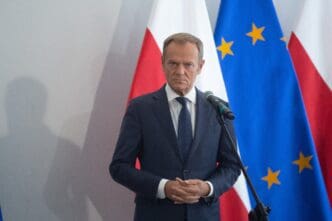Executive Summary
- Poland has secured an exemption from the European Union’s migration relocation scheme, as announced by Prime Minister Donald Tusk.
- The exemption was granted due to Poland’s significant burden of hosting approximately three million Ukrainian refugees and persistent migratory pressure at its border with Belarus.
- Polish officials emphasized their extensive humanitarian efforts and strengthened border security as reasons for not participating in the EU’s asylum seeker distribution plan.
The Story So Far
- Poland successfully sought an exemption from the EU’s recently approved migration pact, which aims to distribute asylum seekers more evenly across member states. This stance is primarily due to the country’s significant burden of hosting approximately three million Ukrainian refugees and the ongoing, intense migratory pressure it faces at its border with Belarus, which requires extensive security deployment.
Why This Matters
- Poland’s successful exemption from the EU’s migration relocation scheme, justified by its substantial intake of Ukrainian refugees and ongoing border pressure, significantly challenges the bloc’s efforts to establish a unified and equitable approach to asylum seeker distribution. This precedent could encourage other member states facing unique migration burdens to seek similar opt-outs, potentially undermining the pact’s intended solidarity and complicating future EU-wide solutions for migration management.
Who Thinks What?
- Polish Prime Minister Donald Tusk and Deputy Prime Minister Władysław Kosiniak-Kamysz believe Poland should be exempt from the EU’s migration relocation scheme, citing the significant burden of hosting Ukrainian refugees and persistent migratory pressure at its border with Belarus.
- The European Union, through its migration pact, aims to distribute asylum seekers more evenly across member states and reform border and asylum procedures for a more unified approach to migration management.
- Brussels has accepted Poland’s arguments, granting an exemption from the EU’s migration relocation scheme, acknowledging the unique pressures faced by the country.
Polish Prime Minister Donald Tusk has announced that Poland will be exempt from the European Union’s migration relocation scheme, stating that Brussels has accepted Warsaw’s arguments. The decision follows Poland’s strong opposition to the pact, citing the significant burden of hosting Ukrainian refugees and persistent migratory pressure at its border with Belarus.
The EU Migration Pact
The EU migration pact, proposed by the European Commission in 2020 and approved by EU governments in May 2024, aims to distribute asylum seekers more evenly across member states. It also seeks to reform the bloc’s border and asylum procedures to create a more unified approach to migration management.
Poland’s Stance on Relocation
Tusk confirmed the exemption in a post on X, declaring, “I said there’d be no migrant relocation in Poland, and there won’t be! Done.” He further highlighted Poland’s efforts in border security, stating, “I said we’d seal the Belarus border barrier—and it’s now Europe’s best-guarded border.” Tusk added that Poland’s toughened visa and asylum laws now serve as a model for others.
Deputy Prime Minister Władysław Kosiniak-Kamysz, speaking in Wrocław, reiterated Poland’s call for exclusion from the pact. He emphasized the “enormous work” Poland has undertaken in receiving approximately three million refugees from Ukraine, describing it as a “global phenomenon.” Kosiniak-Kamysz asserted that this humanitarian effort should justify Poland’s non-participation in the relocation scheme.
Border Security and Pressure
Kosiniak-Kamysz also reported an increase in attempts to cross the Polish-Belarusian border in the past week. He noted that 11,000 soldiers and Border Guard officers are currently deployed along this frontier, underscoring the ongoing security challenges. Poland views this sustained pressure as another reason it cannot accommodate additional asylum seekers under the EU scheme.
Broader Trade Discussions
During the same address, Kosiniak-Kamysz also commented on the proposed free trade agreement between the EU and the South American Mercosur bloc. He stated that his center-right Polish People’s Party (PSL) has consistently opposed the deal since 2019. Kosiniak-Kamysz expressed hope that the agreement could still be blocked, referencing past discussions with presidential aides about forming a blocking minority with Italy.
Implications for EU Migration Policy
Poland’s successful push for an exemption from the EU migration relocation scheme marks a significant development in the bloc’s efforts to manage migration. The decision reflects the unique pressures faced by frontline states and those hosting large refugee populations, potentially setting a precedent for future EU solidarity mechanisms.








